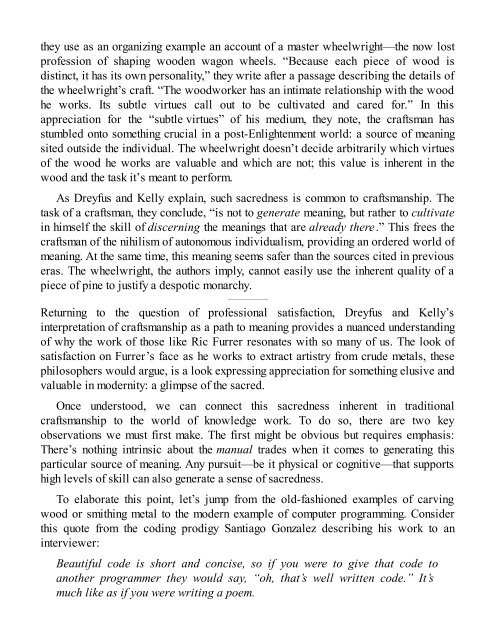Deep Work_ Rules for focused success in a distracted world ( PDFDrive.com )
You also want an ePaper? Increase the reach of your titles
YUMPU automatically turns print PDFs into web optimized ePapers that Google loves.
they use as an organiz<strong>in</strong>g example an account of a master wheelwright—the now lost<br />
profession of shap<strong>in</strong>g wooden wagon wheels. “Because each piece of wood is<br />
dist<strong>in</strong>ct, it has its own personality,” they write after a passage describ<strong>in</strong>g the details of<br />
the wheelwright’s craft. “The woodworker has an <strong>in</strong>timate relationship with the wood<br />
he works. Its subtle virtues call out to be cultivated and cared <strong>for</strong>.” In this<br />
appreciation <strong>for</strong> the “subtle virtues” of his medium, they note, the craftsman has<br />
stumbled onto someth<strong>in</strong>g crucial <strong>in</strong> a post-Enlightenment <strong>world</strong>: a source of mean<strong>in</strong>g<br />
sited outside the <strong>in</strong>dividual. The wheelwright doesn’t decide arbitrarily which virtues<br />
of the wood he works are valuable and which are not; this value is <strong>in</strong>herent <strong>in</strong> the<br />
wood and the task it’s meant to per<strong>for</strong>m.<br />
As Dreyfus and Kelly expla<strong>in</strong>, such sacredness is <strong>com</strong>mon to craftsmanship. The<br />
task of a craftsman, they conclude, “is not to generate mean<strong>in</strong>g, but rather to cultivate<br />
<strong>in</strong> himself the skill of discern<strong>in</strong>g the mean<strong>in</strong>gs that are already there.” This frees the<br />
craftsman of the nihilism of autonomous <strong>in</strong>dividualism, provid<strong>in</strong>g an ordered <strong>world</strong> of<br />
mean<strong>in</strong>g. At the same time, this mean<strong>in</strong>g seems safer than the sources cited <strong>in</strong> previous<br />
eras. The wheelwright, the authors imply, cannot easily use the <strong>in</strong>herent quality of a<br />
piece of p<strong>in</strong>e to justify a despotic monarchy.<br />
Return<strong>in</strong>g to the question of professional satisfaction, Dreyfus and Kelly’s<br />
<strong>in</strong>terpretation of craftsmanship as a path to mean<strong>in</strong>g provides a nuanced understand<strong>in</strong>g<br />
of why the work of those like Ric Furrer resonates with so many of us. The look of<br />
satisfaction on Furrer’s face as he works to extract artistry from crude metals, these<br />
philosophers would argue, is a look express<strong>in</strong>g appreciation <strong>for</strong> someth<strong>in</strong>g elusive and<br />
valuable <strong>in</strong> modernity: a glimpse of the sacred.<br />
Once understood, we can connect this sacredness <strong>in</strong>herent <strong>in</strong> traditional<br />
craftsmanship to the <strong>world</strong> of knowledge work. To do so, there are two key<br />
observations we must first make. The first might be obvious but requires emphasis:<br />
There’s noth<strong>in</strong>g <strong>in</strong>tr<strong>in</strong>sic about the manual trades when it <strong>com</strong>es to generat<strong>in</strong>g this<br />
particular source of mean<strong>in</strong>g. Any pursuit—be it physical or cognitive—that supports<br />
high levels of skill can also generate a sense of sacredness.<br />
To elaborate this po<strong>in</strong>t, let’s jump from the old-fashioned examples of carv<strong>in</strong>g<br />
wood or smith<strong>in</strong>g metal to the modern example of <strong>com</strong>puter programm<strong>in</strong>g. Consider<br />
this quote from the cod<strong>in</strong>g prodigy Santiago Gonzalez describ<strong>in</strong>g his work to an<br />
<strong>in</strong>terviewer:<br />
Beautiful code is short and concise, so if you were to give that code to<br />
another programmer they would say, “oh, that’s well written code.” It’s<br />
much like as if you were writ<strong>in</strong>g a poem.



